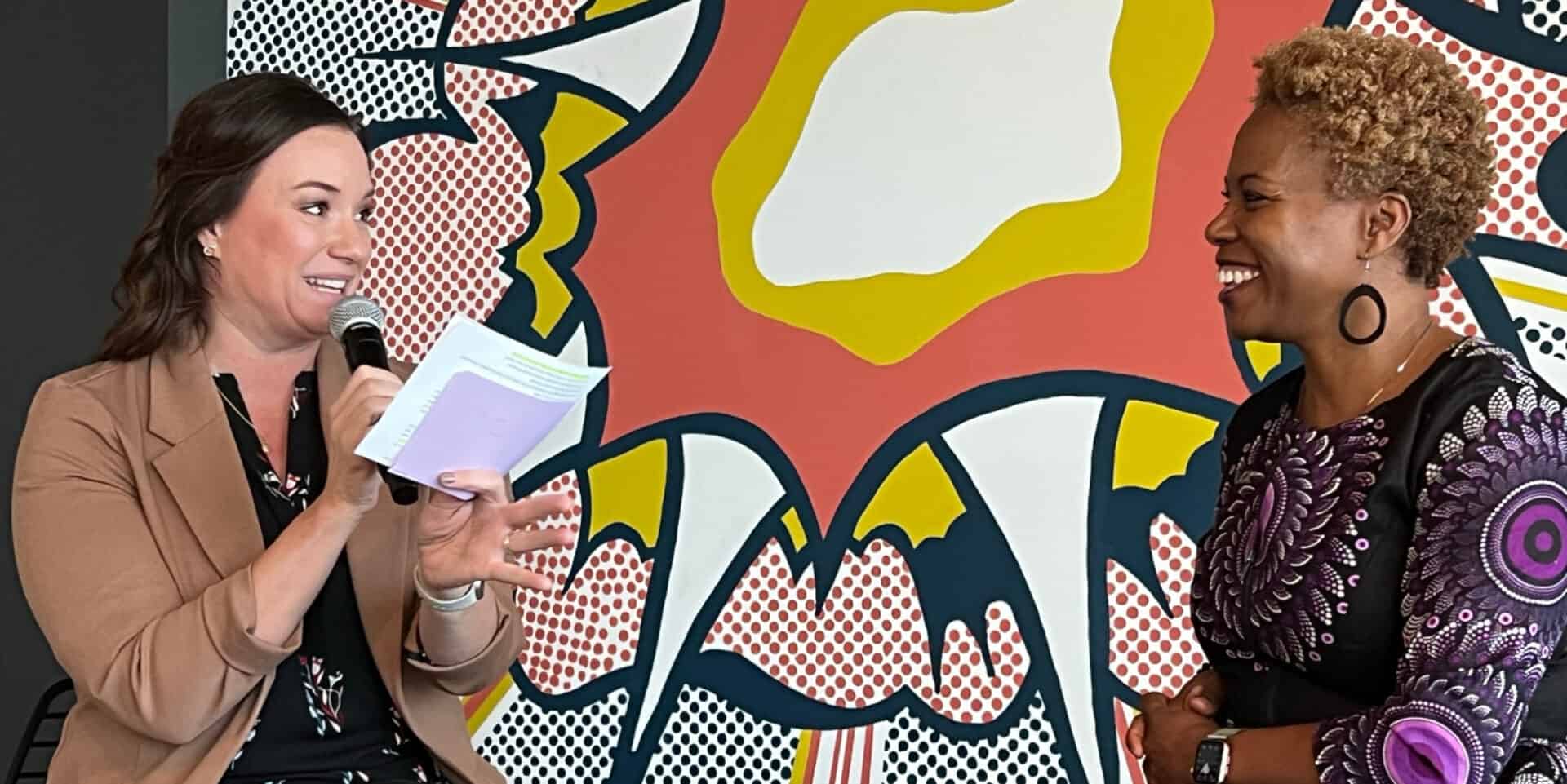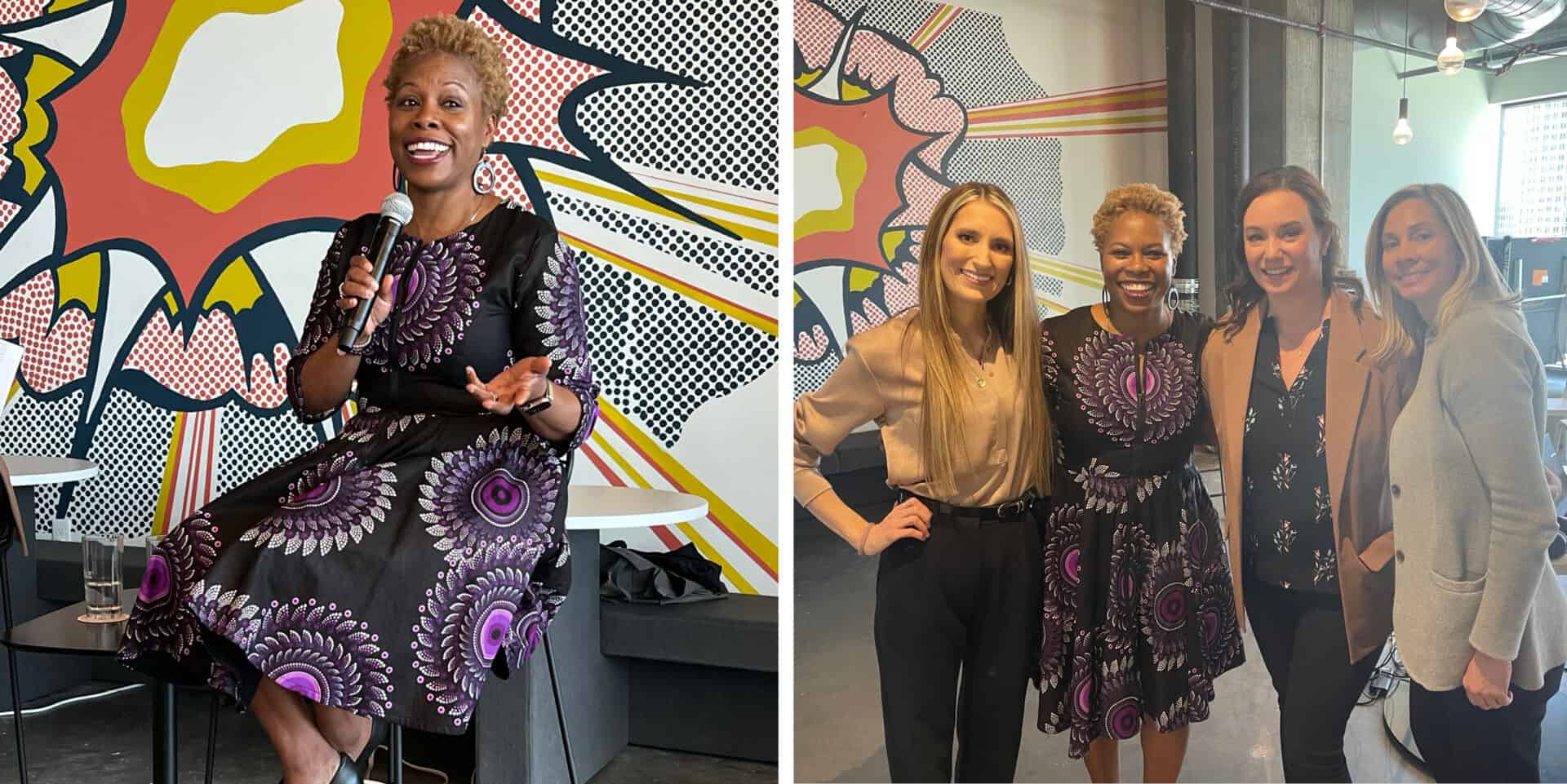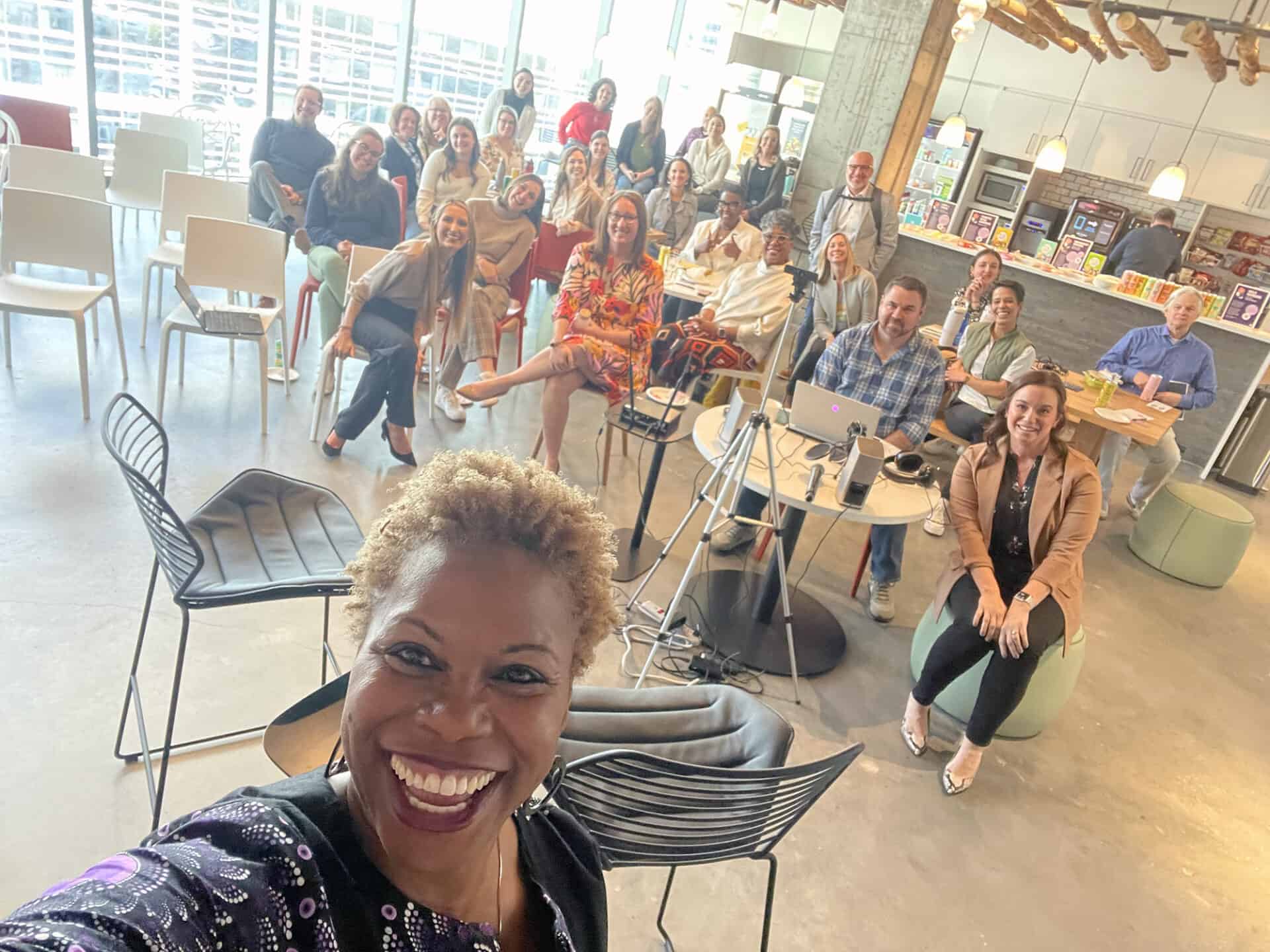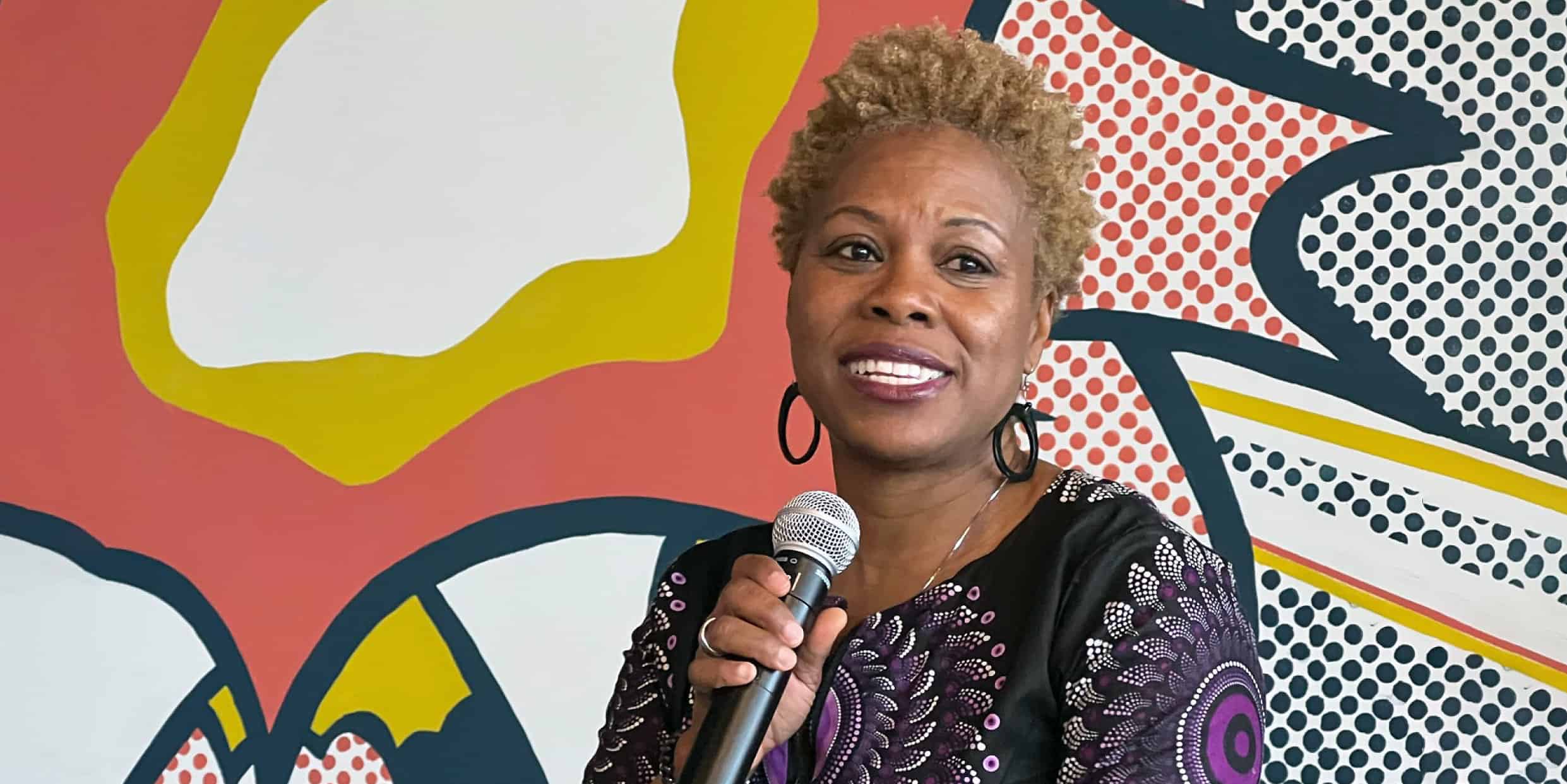I met Jacqie McWIlliams four year ago through a Corporate Real Estate for Women (CREW) leadership program. She spent a day with us, talking about what it means to be an authentic leader. I vividly remember walking away feeling so inspired by her authenticity, enthusiasm and general advocacy for women and creating space for women in leadership. I immediately did what anyone would do—I followed her on Instagram and continued to be inspired by her.
As the first female commissioner of the CIAA athletic conference, Jacqie has supported women’s leadership throughout her renowned career. Despite the challenges of being female in a male-dominated field, Jacqie has risen through the ranks, bringing her infectious joy to every position. When Little’s women focused employee resource group, She Belongs, got together to brainstorm ideas for celebrating International Women’s Day, inviting Jacqie to speak to our firm was a no-brainer. I was thrilled when she accepted.
On March 8, Jacqie joined me for a firmwide event where she shared her career journey and what it means to be a professional woman and leader in today’s world. I took the International Women’s Day 2023 theme, Embrace Equity, and used the word “embrace” as an acronym for the topics we discussed. I’m excited to share a recap of our conversation below.
E: ENERGY | WHAT MOTIVATES YOU? HOW DO YOU MAINTAIN YOUR ENERGY AND AVOID BURNOUT?
Jacqie McWilliams: I’m motivated by the opportunity to make a difference in the lives of the individuals I encounter. I’m a prayerful woman, so everyday when I get up, I ask for the energy needed to make a difference. I want to see other people for who they are (not their titles) and have them see me as a person who gives joy and energy.
Energy is something you must preserve. I’m very intentional about what energy I give and allow in—even when it comes to family. Being strategic about what to say yes to and having the confidence to say no, are important to preserve energy. I think we as women do a bad job at creating those boundaries. My daughter calls it FOMO, where you have this fear of missing out because if we say “no” we potentially get left behind. As women, we shouldn’t put that on each other. I’ve tried to create a culture in our office that creates boundaries for people, but also gives them pathways for opportunities.

M: MENTORSHIP | WHAT ROLE HAS MENTORSHIP PLAYED IN YOUR CAREER?
Jacqie McWilliams: I’ve had mentors who are near and far. Thirty years ago, when I was first getting into this industry, I didn’t see a lot of women. I did what I needed to do to try to keep my position and be seen. Naively, we all think that once we get a Master’s degree, we have arrived and can get a job anywhere. But that’s not true. It’s about knowing people in your industry who have seen you and can speak on your behalf. You need mentors and sponsors to help facilitate connections.
I worked for my mentor at the NCAA, but she was my mentor from a distance. At first, we weren’t very close at all. All I knew was that she was this tough woman in athletics, and, boy, I just needed to get in her atmosphere. I learned a lot from her, and she helped me position myself for this role at CIAA. Over the years, we connected more deeply. You must humanize people if you want them to be your mentor.
You never know who’s watching you. As I’ve seen and sought out mentors from a distance, I’m acutely aware that others could be doing the same to me. How do I carry myself? How do I manage myself and meetings? It really matters, because you don’t have to have a one-on-one with somebody to be a mentor. Take Oprah. She’s excellent. Study her. Watch how she navigates. I think you can learn how to manage and lead by watching.
B: BIAS | BIASES IMPACT WOMEN EVERY DAY. HOW CAN WE CONTINUE TO MAKE PROGRESS TO OVERCOME THESE?
Jacqie McWilliams: I think you start with yourself first. The things you hear—when do you stop people from having certain conversations? Be bold. When you know things are being said, or views may not be in the right place for the space, have courage to hold people accountable.
We all have biases but being open to all the different things people bring to the table is part of the joy. I’ve learned to not look at people as if I know them. We’re all different. If you humanize individuals for who they are—regardless of their country of origin, sexual orientation, what have you—we can meet people where they are.
However, you can only do that when you meet yourself first. You have to look in the mirror everyday and be okay with who you are and others who are different than you.
We don’t have enough diversity, and those who are sitting at the table sometimes don’t even see it. Before we make any decision, I’ve learned to ask: Who haven’t we talked to that could affect or be affected by what we are doing? Whether it’s a student athlete, coach, or corporate partner – have we included everyone? At the end of the day, if you have a heart, are kind, and open to allowing people in your space, you can start shedding biases. You don’t have to like something, and it’s okay to not agree. But don’t treat others like they don’t belong.
R: RESILIENCE | ARE THERE RESOURCES THAT WE CAN USE TO HELP OURSELVES BECOME MORE RESILIENT AS INDIVIDUALS AND AS AN ORGANIZATION?
Jacqie McWilliams: I’ve always said the CIAA is a resilient conference, and I’m a resilient person. It all might look cute right here, but there’s a lot behind that. *laughs* You have to own your whole self—issues included—and be forgiving. Resiliency takes time. It takes practice. It takes community, and sometimes, even getting rid of community.
Not everyone will think of you favorably. There’s a lot of haters, and a lot of celebrators, right? You’ve got to recognize that not everyone wants your success the way you see it. But, as I’ve said, I’m a woman of faith. At the end of the day, I know that God put me here, and has given me the position I’m in. It’s my dream job.
Failing and falling is just part of the process. My mindset is that challenges are simply opportunities. Resiliency is knowing that if you do find yourself in a bad place, you can get out of it. I do check points all the time on my emotional, spiritual, physical, and intellection well-being. I’ve been through hard things, and it’s so important to have the right people around. Resiliency is a journey, one that you aren’t on by yourself. You need others.
When it comes to building resiliency as an organization, it’s important to create an atmosphere within your team where it’s okay to fall and fail. I always ask my team, “Did you get fired today?” When they say no, I’m like, “Okay, let’s go.” Own the mistake and move on.
Mistakes make you better. I heard someone on Tiktok say, “Practice makes perfect.” No, practice does not make perfect. There is no perfection in anything you do. Practice allows you to get better, and it’s repetitive. The more you repeat, the better you get. Whether you are a young professional or a seasoned professional, you’re going to make mistakes. Own it, and then let’s figure out how to recover together as a team.

A: ADVOCATE | HOW DO WE BECOME BETTER ADVOCATES FOR OTHER WOMEN?
Jacqie McWilliams: Sometimes, it’s just as simple as acknowledging other women. I’ve fallen in love with a slogan used during Black History Month—I hear you. I see you. I celebrate you. It humanizes individuals.
The other day, I was on a call, and out of probably 20 people, I was the only brown woman there. I certainly deserved to be there because I’ve worked at the NCAA. I’ve been through the governance structure. I get it, and they know I do. But I did have the thought, “If I wasn’t here, who’s advocating in this space for people who need it?” Initially, I didn’t want to be on this committee, but my teamed pushed me because it is important to be at the table. When you’re at the table, you’ve got to strategically use your voice—and not just on things that are big.
When I was pregnant, my organization decided to change the maternity leave policy, which was going to reduce the number of weeks I could take leave. You better believe I advocated for myself and fellow pregnant colleagues. I remember writing a letter and giving it to my mentor and boss, as a heads up. I told her that I’m sending this letter to the United States President, because what was happening was just plain wrong. If I didn’t advocate for us, who would?
It’s not just women advocating for other women. Men play a big role, since they’re all in the leadership positions. In the athletics industry, there’s 1% of us who are women of color and, probably, 13% women overall. Who gets to make the power moves? It’s not us. And, when we do, I think we’re extremely inclusive. But, men? It’s easy to hire guys from your network. We see it all the time. There are some good male leaders out there, and we acknowledge them in our industry. I’m fortunate to work with five women and seven men presidents. The men are just as strong advocates for the women, as they are for the men.
It’s getting better, but there’s still a lot of work to do. Men, we need you. We absolutely need you to be advocates and sponsors for us and hold us accountable when you feel like we’re not ready.
C: CARE | HOW DO WE MAKE SURE WE CARE FOR OURSELVES WHILE ALSO MEETING THE EXPECTATIONS OF OUR PROFESSIONAL LIVES?
Jacqie McWilliams: I think it’s boundaries—again and again. As the CEO, I can create the culture of thriving. I think you have to be mindful of the cultures that you’re working in. I need family and community. There are people on my staff who if their family life isn’t good, I know I’m not going to get 100% from them. I know this and am very mindful of paying attention to that.
I do think boundary-setting is critical for women. Family is just as important as work. I always tell my daughter, Samone, that I don’t want to be that mom who when she gets older, she says, “You were never there for me. You’re such a terrible mom!” When I’m with my daughter, I am present. I’m learning to give her the time she needs of my full attention. It’s respectful.
It’s so easy to stay on the go. If you’re not careful, you’ll hit brick walls. Take time away. I’m taking a week off at the end of the month. I’m not going anywhere, but I’m just taking a break from work. April is full of spring championships, board meetings, and all these other things—I know that if I don’t, I run the risk of crashing and burning. You have to prioritize your mental, physical, and spiritual well-being.
E: EQUITY | HOW DO YOU ENVISION AN EQUITABLE WORKPLACE OR WORLD?
Jacqie McWilliams: I wish we could just reset and get rid of all the systemic things that we as women and people of color have dealt with as a culture and community. You know, if you’re qualified, you would be ready for the position no matter your ethnicity. You would just be seen as an individual.
I’m a woman. My pay scale is different than that of my male counterparts. I hope when our kids grow up, they aren’t having the same conversations that we constantly fight for—like pay equity. We need men and women. We need a balance of what we do, but I hope the fight is different.


